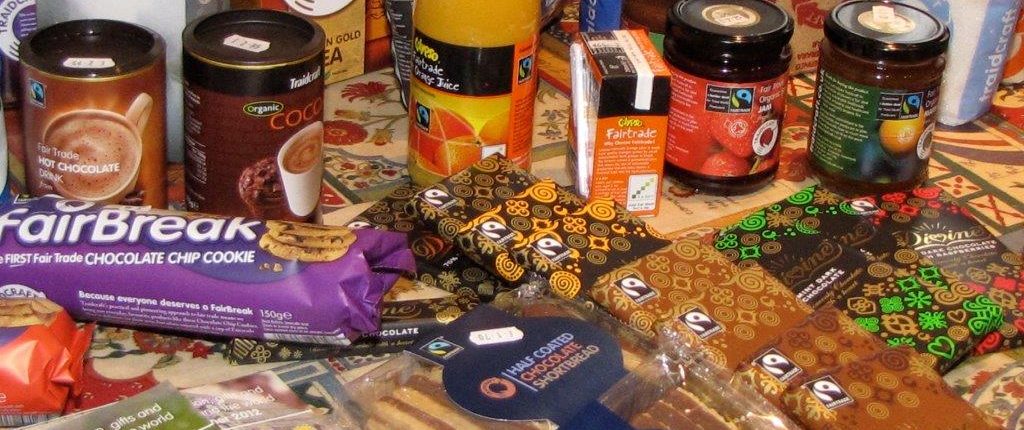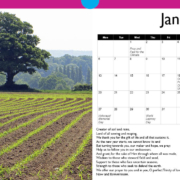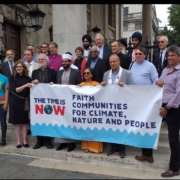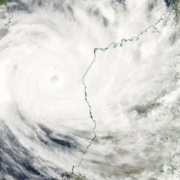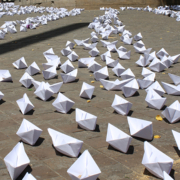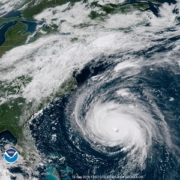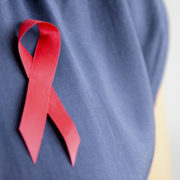Urgent Actions on Aid and G7
Two Urgent Actions: Aid and G7
Pray and act to get back to 0.7%
On Monday there will potentially be a vote on aid. Former International Development Secretary Andrew Mitchell has tabled an amendment to the Advanced Research and Invention Agency Bill which would require the Government to reinstate our commitment to give 0.7% of Gross National Income (GNI) in aid for 2022. In essence, the BBC explains, the amendment would “oblige the new agency to make up any shortfall in aid spending if the government were to miss the 0.7% target.”
The commitment to give 0.7% of GNI in aid – a fundamental part of our obligation to help combat poverty – was enshrined in law in 2015 and has cross-party support. Maintaining it was part of the Conservative Party’s election manifesto. But last November, the Chancellor announced a temporary cut to 0.5% – and Government has refused to give a date for when the full target will be reinstated.
The decision to reduce the amount to 0.5% – coupled with a decline in our GNI – has reduced our total aid budget by about £4 billion just at the moment where poorer countries and communities desperately need help fighting the challenges posed by COVID 19, conflict and hunger. The results have been devastating, as our blog on aid and countries affected by conflict shows. While not all aid decisions may be ones that any individual would favour, aid overall has a tremendous positive impact. The cuts are jeopardising key programmes that give food to people facing acute hunger, access to clean water and sanitation to people for whom it could be a lifesaver, funding to crucial research, and assistance with some of the world’s most serious humanitarian crises.
The amendment needs to be selected by the Speaker – who could refuse it on the grounds that it is not within the scope of the bill. If it does get through, then it needs votes. Already at least 30 Conservative MPs have pledged support; only a few more are needed to create a majority. Please:
- pray that the amendment will be selected
- pray that the public response will show support for meeting our full aid commitment
- pray for the success of the amendment
- ring your MP or email them this weekend. You can use online forms from the Joint Public Issues Team or Global Justice Now, or, use our blog, an article from BOND and/or this CTBI briefing to compose your own email (something you write yourself is always the most effective). And we’d be really grateful if you could let us know if you do it.
Pray and act for progress at the G7
From the 11th to the 13th (this coming Friday to Sunday), the G7 leaders will be meeting in Cornwall.
It’s a brilliant opportunity for our Government – as hosts of both the G7 and the forthcoming UN Climate Talks (COP26) – to show leadership in a number of areas. One is vaccine equity. Another is climate finance.
Prayer and Action on Vaccine Equity
On vaccines, the current lack of equity is staggering. The UK, with its population of just under 70 million, had offered more than 32 million vaccine doses by mid-April. But at a recent (3 June) briefing, the WHO stated that only 31 million doses had been administered across the whole continent of Africa, whose population is almost 1.4 billion. Or, to put it in a different way; in high-income countries, about 62 doses have been distributed per 100 people. In sub-Saharan Africa, only 1 dose has. In many countries, even the most at-risk groups – the elderly, health care workers, and people with serious illnesses – can’t access vaccine protection.
Numbers give an overview – but it’s hard to relate to them. All of us, however, will have seen the agonising pictures of individuals grieving in India. And those of us with friends, family or colleagues in other parts of the world will know the sorrow of losing loved ones as countries encounter their second or third waves … people who would have had the vaccine, had they lived here.
Faith, health and humanitarian leaders have issued a joint declaration, which states bluntly: “We have a choice: vaccine nationalism or human solidarity.” It calls on world leaders to, among other things, “Ensure equitable access to vaccines between countries by providing vaccines, sharing knowledge and expertise, and fully funding the Access to COVID-19 Tools (ACT) Accelerator, which is working to provide equitable access to and implementation of COVID-19 diagnostics, therapeutics, and vaccines.” They also point out the simple fact that enabling vaccinations to occur globally is not simply altruism: because leaving large numbers of people unvaccinated can lead to the development of variants that may escape vaccines, it is also in wealthy countries’ own interest.
As the statement suggests, a number of things need to happen to achieve vaccine equity. In the short term, countries that have ordered more doses than they need for their populations can donate some of their vaccines to other countries. To put this in perspective, data show that Canada, the US, UK, EU and Japan have collectively ordered 5.3 billion doses of vaccine for their populations, which total around 1 billion. Some are already making a start: the US has committed to sharing 80 million doses and is already beginning to distribute them. The heads of the Wellcome Trust and UNICEF have issued an open letter to Boris Johnson, asking him to commit to donating 20% of the UK’s doses, which could, they say, be done without affecting the UK’s vaccination schedule. They also ask him to call for the G7 to commit to sharing 1 billion doses collectively, and to fully funding the ACT Accelerator.
Looking towards the longer term, there are bigger questions – to what extent should companies be allowed to profit from publicly funded research? When is it legitimate to override current intellectual property rights in order to save lives … and would it be possible to devise a system which both continued to encourage research and enabled greater sharing of the outcomes? How can countries’ capacity to manufacture their own vaccines be increased? Some of these questions are explored in a new briefing from the Anglican Alliance and the Anglican Health and Community Network – it’s worth a look.
In the next few days, if you can, please:
- Pray for the G7 to take steps which will both address the immediate need for vaccine doses and start to address the longer-term structural inequalities in access to essential medicines.
- Read the Anglican Alliance or other briefing materials that give insight into the issues surrounding vaccine equity
- Take part in the ‘Wave of Hope’ campaign
Prayer and Action on Climate Finance
On climate finance, there are two main asks. The first is that the G7 countries will reduce their own investment in fossil fuels – and redirect the funds in ways that promote a true green recovery from COVID. Tearfund, the Overseas Development Institute (ODI) and the International Institute for Sustainable Development (IISD) have produced an excellent report on this – which reveals that in their COVID recovery plans, G7 countries have spent more on support to fossil fuels than on support to clean energy and makes three suggestions to help them ‘clean up their act’. Worth reading.
The second is that the G7 will commit to the climate finance that is needed for a breakthrough at COP26 – and specifically that it will commit to new and additional funding for loss and damage, which helps countries deal with the impacts of climate change, such as the devastation in the Caribbean after Hurricane Maria, for which no level of adaptation can prepare. The Faith for the Climate COP26 Task Force has material on this.
In the next few days, if you can, please:
- Pray for the G7 to act well on climate finance. Tearfund has prayers for the G7 in their Prayer in the Park resource.
- Read some of the Tearfund or Faith for the Climate materials
- Send a postcard to Boris Johnson – it’s very simple! – as part of Christian Aid’s #WishWeWereThere campaign.
Refugee Week Resources
Refugee Week is coming up! It’s from 14 to 20 June, with 20 June designated as Refugee Sunday/Sanctuary Sunday.
We have a suite of resources to make it easy for your church to participate. Take a look!
Our new resources include:
- Updated facts and figures – to help dispel some of the myths around refugees and asylum seekers
- Updated guide to online worship resources – material for worship and private prayer
- Notes for a talk – based on the Revised Common Lectionary readings
- Prayer stations page – with thanks to Rev Ben Kautzer for allowing us to share his materials
- Updated guide to supporting refugees in Oxfordshire – done with our wonderful partners
We also have a new video – Together in Welcome – which will be available from early next week. In it, eight Thames Valley Christians share their vision of a welcoming society. It’s both inspiring and accessible – watch this space!Pray and Fast June Prayer Points
The June Pray and Fast for the Climate prayer points are now available. Topics: the G7, Young Christian Climate Network relay, evaluating green promises, changes in the making for fossil fuel companies, warnings from the polar region, eco-anxiety in children, and a major court victory for eight Australian teens. Join in the prayers – and share them widely.
Prayers for the Environment and Tax Justice
Prayers for the Environment
The 5th of June is World Environment Day – and the Sunday nearest that is traditionally celebrated as Environment Sunday. Some of our readers will be holding Climate Sunday or Environment Sunday services in their church – others may wish to focus their personal prayers on this area throughout the coming week.
It’s a great time to browse through the Care for Creation section of our website. We have links to prayers and hymns of thanksgiving and praise, prayers and hymns of lament and confession, prayers of intercession and commitment, preaching resources and more. Take a look!
Prayers for Tax Justice
The 6th of June is also Tax Justice Sunday this year. It’s a time to note the ways in which “the tax system can play a vital role in building more just and sustainable societies, and in fostering good relations between human beings” (Church Action for Tax Justice [CATJ]) and to commit ourselves to working for fair tax systems that promote the common good.
Tax is very much in the news this weekend, as the G7 Finance Ministers have just agreed a proposal that would create a minimum global corporation tax and require the largest companies to allocate profits (and hence pay taxes) in countries where they make their sales, even if they are not physically present there. The proposal is being hailed by many as a breakthrough, and is certainly a step in the right direction, as it (a) moves the global system away from a ‘race to the bottom’ in which countries compete to attract business by cutting taxes and (b) makes it harder for companies to reduce their taxes by profit shifting. The Tax Justice Nework has noted, however, that there is also scope for improvement, as (a) many would argue that the minimum tax rate proposed is too low, (b) the way in which it is framed will benefit G7 countries far more than developing countries, and (c) the G7 action preempts a larger process being undertaken by over 130 countries in the context of OECD tax negotiations. So there’s material for both thanksgiving and challenge.
You might want to use a prayer from the CATJ Tax Justice Sunday materials – such as Reverend Alison Tomlin’s ‘Thanksgiving’ – which also ties into Environment Sunday and contains a commitment to strive for justice. Download the prayer here.
Christian Concern for One World
c/o The Rectory, Church End
Blewbury OX11 9QH
ccowemails@ccow.org.uk


